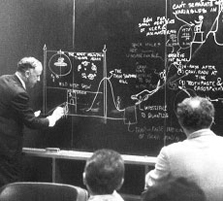
here’s
a great intellectual adventure ahead,” declared Max Tegmark to an audience
that included 18 Nobel laureates at the launch of the program FQXi (Foundational
Questions Institute in Physics and Cosmology) in 2006.


Tegmark, associate professor of physics at the Kavli Institute for Astrophysics
and Space Research at MIT, is the scientific director of FQXi, in partnership
with Anthony Aguirre, associate professor of physics at the University
of California, Santa Cruz. The Institute defines its mission as: “To
catalyze, support, and disseminate research on questions at the foundations
of physics and cosmology, particularly new frontiers and innovative ideas
integral to a deep understanding of reality but unlikely to be supported
by conventional funding sources.”

In pursuing these objectives, FQXi’s main activity is supporting research.
The four-year program, which runs until the end of 2009, will award approximately
$5 million in grants in two phases, as well as a number of mini-grants
awarded each year for travel, lecture programs, workshops, and other
small projects initiated by FQXi members. The inaugural awards, 30 in
number and totalling almost $2.2 million, were announced in July 2006.
The most recent batch of mini-grants was awarded in the fall of 2007
to 18 applicants, totalling just over $100,000. The winners of the second
round of large grants were announced at the end of July, 2008.

Anthony Aguirre highlights another project initiative. “We’re launching
a global essay contest on the question: What is the nature of time? I
think that’s one of the biggest questions because time comes directly
into cosmology, into understanding quantum gravity,” he says. “Time is
everywhere, it’s at the core of a lot of cutting-edge issues in physics.”
FQXi plans to support other essays and contests, with prizes awarded
for a variety of subjects, with the purpose of identifying and supporting
pioneering thinkers and stimulating innovative approaches to foundational
questions.

Is the “great intellectual adventure” forecast by Tegmark actually happening?
“I would say so,” claims Aguirre. “My experience of it has been gratifying,
both in looking at the research that has come through, funded by FQXi,
and also in seeing the community of scientists pursuing these big questions
get together, become more of a real community, meet physically in certain
cases, and generate an enormous amount of dynamics.”

One of the opportunities for that community to meet was the inaugural
conference of FQXi held in Iceland in 2007. Scientists discussed a variety
of cutting-edge topics, including the direction of time, the possibility
of multiple universes, the nature of quantum reality, and the place of
consciousness in the cosmos. Tegmark told ABC Radio: “Here at this conference,
this excitement that people feel when they share their amazing discoveries
with each other is really palpable, and that’s one of the most fun things,
I think, about being a scientist.”

Tegmark has described FQXi as “an attempt to enable scientists around
the world to work on those things which they are really passionate to
work on but haven’t really been able to.” Aguirre elaborates on this,
“There isn’t an external imposition on FQXi thinkers about what they
should and should not be thinking about. There aren’t things that are
out of bounds.” FQXi will enable innovative thinkers in physics and cosmology
to pursue their real interests “not just late at night and on weekends.”

Those interests will engage big questions. Besides the issue of time
being addressed in the essay contest, Aguirre identifies another big
question that rivals it in the FQXi agenda: “Fine-tuning—the fact that
it seems the universe and the laws of physics have certain properties
that, if slightly changed, would render the universe uninhabitable, at
least for life like us. Why are we so fortuitous as to have a universe
that is so hospitable to us? Almost every answer to this question is
very interesting.”



 here’s
a great intellectual adventure ahead,” declared Max Tegmark to an audience
that included 18 Nobel laureates at the launch of the program FQXi (Foundational
Questions Institute in Physics and Cosmology) in 2006.
here’s
a great intellectual adventure ahead,” declared Max Tegmark to an audience
that included 18 Nobel laureates at the launch of the program FQXi (Foundational
Questions Institute in Physics and Cosmology) in 2006.